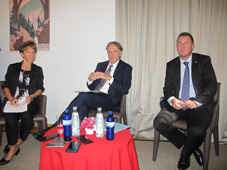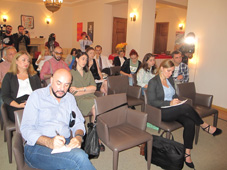
Representatives of Georgia and Switzerland discuss ways to handle irregular migration
By Nika Gamtsemlidze
Thursday, September 19
Switzerland and Georgia are strengthening cooperation on migration. On September 17, Mario Gattiker, State Secretary of Switzerland for migration attended a special press conference held in the residence of the Ambassador of Switzerland to Georgia, H.E. Mr. Patric Franzen.
H.E. Mr. Franzen introduced Mr. Gattiker to the audience and presented a comprehensive list of the meetings the Swiss State Secretary planned to attend within the scope of his visit. Including meetings with the Minister of Justice, Tea Tsulukiani and the Minister of Foreign Affairs, David Zalkaliani, and Vakhtang Gomelauri, the Minister of Interior.
On September 16, State Secretary and Interior Minister, signed a joint declaration aimed at strengthening cooperation between the two countries in tackling irregular migration.
“The declaration was signed with the Minister of Internal Affairs Vakhtang Gomelauri as the number of asylum seekers from Georgia has increased and this is a problem for us. Given that we have very good cooperation with the Ministry, this declaration will simply help to further deepen the relations between the two countries on migration issues,” noted Gattiker.
Since visa liberalization, citizens of Georgia do not require a visa to enter the Schengen area countries. Switzerland, being one of the countries from the area, has registered a sharp increase in unfounded asylum applications from Georgia (+87% in 2018 compared to 2016).
Also, according to the official information these applications have almost no chance of being accepted (refugee status recognition rate: 0%). Moreover, certain persons lodging applications for asylum suffer from severe medical issues requiring urgent care, which complicates the return process.
Since the visa liberalization, Switzerland has called on Georgia to take appropriate measures. On its side, Switzerland pursues a swift and consistent policy of return to their country of origin.
To address this phenomenon, Switzerland has, in collaboration with Georgia, put in place several measures. A process of cooperation has been established in May of this year between the State Secretariat for Migration, the Swiss embassy in Tbilisi and the Georgian Health Ministry, to enable the swift processing of asylum applications by Georgian nationals suffering from complex health issues.
This cooperation process helps to swiftly identify the possibility of medical treatment in Georgia and consequently assess the person’s return. In that regard, after the talks with the Ministry of Health, Mario Gattiker visited an intensive care oncology unit at a hospital in the capital to see for himself the level of care in treating cancer patients.
Also, Switzerland and Georgia are working for tightening border controls. In June, Switzerland seconded an official to the airport at Kutaisi (second largest city) for a month to support the local authorities in their tasks and to provide additional technical assistance on border controls at departure within the framework of Frontex, the European Border, and Coast Guard Agency.
On 28 August, the Federal Council of Switzerland decided to add Georgia to the list of ‘safe countries.’ As of 1 October 2019, Georgia will join the list of countries to which the return of asylum seekers whose applications have been denied is considered reasonable.
Mr. Gattiker also responded to a question about the EU's mechanism for stopping visa-free travel.
According to Mr. Gattiker, Swiss government thinks “that Georgia deserves visa liberalization and the citizens of the country should travel in the Schengen Area without a visa and have supported it since the beginning. As he noted, everyone who is considered to be an asylum seeker in Switzerland and will address the authorities with this demand, “will definitely get rejected and we will send them back to Georgia. This is what helps Georgia to prevent visa liberalization from stopping.”
The Ambassador of Switzerland also answered the questions of local media representatives. Talking about the proposal of European Georgia to put sanctions on Russia, Ambassador said that every sanction comes with its consequences.
According to H.E. Mr. Franzen, Switzerland is a country of dialogue, both internally and externally. As he noted, every representative in the parliament should have the opportunity to present an initiative to the parliament and discuss it with their colleagues.
As Ambassador noted, Georgia and Russia are neighbors and neighbors often have common interests, but, according to him, they also have problems and they need to work together to find a solution. He also noted that the fact that part of Georgia is occupied represents a problem which needs to be addressed.
In response to the rise of asylum applications from Georgian nationals, Switzerland and Georgia had already taken measures in 2018, but these had limited impact. In particular, Switzerland has strengthened protection at external borders and imposed entry bans in cases where the asylum claim was unfounded.
For its part, Georgia has made efforts to strengthen border controls and has conducted several information campaigns on the rights and obligations of visa-travel in the Schengen area. Finally, Georgia has tightened its criminal code to combat irregular migration.
The Swiss delegation, led by Mr. Gattiker concluded their working visit to Tbilisi yesterday, on September 18.



